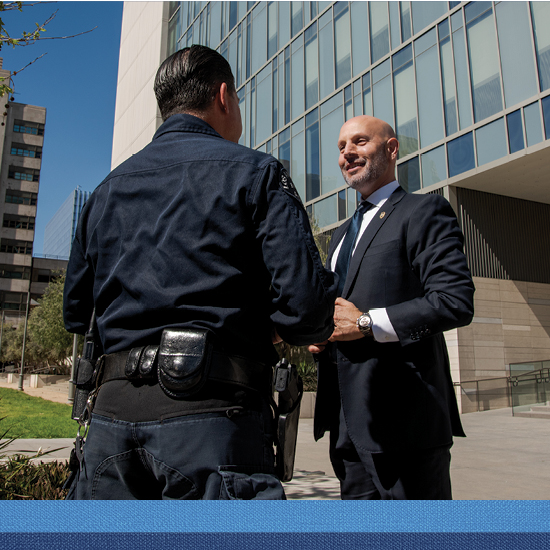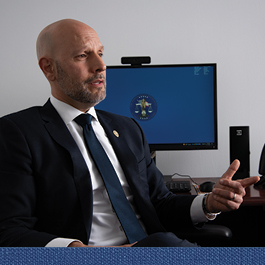Called to Respond
LAPD chief police psychologist Edrick Dorian (PsyD ’03) supports the city’s first responders through times of crisis and calm
In the year 2021, surveys measuring the mental health status of law enforcement agents indicated alarming increases in rates of depression, anxiety, posttraumatic stress disorder, hopelessness, and despair among them nationwide. Over the last two years, public opinion of first responders has shifted significantly. Deemed heroes during the first wave of the COVID-19 pandemic, they fell to public enemy number one during the anti-police protests following the murder of George Floyd. Widespread calls for reform have reverberated through agencies and invited more scrutiny of police officers and their actions than ever before, particularly regarding discriminatory practices against Black Americans. Edrick Dorian, chief police psychologist of the Los Angeles Police Department (LAPD), knows intimately the realities of the profession and how the daily pressures and perils of the job impact officers, their families, and the communities they serve.
The native Angeleno was drawn to police psychology by a combination of desires to aid those who serve and protect us and to apply the practical wisdom of the behavioral sciences in overcoming some of the greatest challenges impacting society. When Dorian started his career with the LAPD in 2006, police and public safety psychology would not be recognized by the American Psychological Association as a distinct specialty area for another seven years. Today, he is inspired by the people he works with and serves, who he describes as individuals who have committed to a cause greater than themselves and a readiness to face daily challenges with discipline, camaraderie, courage, and compassion.
What are some misconceptions about mental health as it relates to police officers or first responders?
I believe two of the biggest misconceptions are that first responders must all be traumatized by virtue of their professional experiences and that they are generally averse to psychological services. It is true that, unfortunately, a percentage of first responders develop posttraumatic stress reactions during their careers, but the reality is that most prove to be resilient in the face of trauma. It’s important for the public to know that, today, large police agencies like the LAPD have embedded mental health professionals who routinely provide clinical training and consultative services throughout the department. As a result, personnel receive high exposure to, experience with, and education from mental health professionals, resulting in substantial use of psychological services and a much more psychologically minded workforce than they might imagine.
How do regular sessions with first responders impact their capacity to do their jobs well?
At Behavioral Science Services, the division I oversee, both sworn and civilian LAPD personnel can obtain individual and relationship psychotherapy from police psychologists, nutritional counseling from a registered dietitian, and peer-based substance abuse counseling from specially trained police personnel. Moreover, we have mandated protocols for the aftermath of officer-involved shootings and other major uses of force, serious traffic collisions, and exposures to extreme or graphic circumstances such as serious injuries or deaths involving children or multiple victims. All these services combine to promote psychological, emotional, physical, social, and career well-being.

Is police psychology designed to benefit first responders themselves or create a more healthy environment for the individuals they interact with?
One of the rewards of being a psychologist serving first responders is knowing that by extension of one’s services, one is also having an indirect impact on the community they serve. Police psychology arguably traces its roots to the early 20th century with a focus on crime detection and police selection, but the provision of direct psychological services to law enforcement personnel became a dominant focus in the late 1960s. As the field has matured, the focus has broadened from psychological interventions to psychological assessments of police candidates, operational support activities such as crisis negotiations, and consultation activities to improve organizational effectiveness. Police psychologists’ activities in each of these domains have the potential to benefit the officers themselves, create a more harmonious work environment, and improve contacts and relations with community members.
Cognitive errors are more common when someone is under stress, and when faced with a crisis, most humans get into fight or flight mode. First responders often have to react in ways that betray what comes naturally. How do they exercise the mental toughness required to do their jobs well?
It first begins with a general goodness-of-fit to the demands of the profession. The reality is being a first responder is not for everyone. Police officers, for example, are initially selected based on their personal history of behaviors and character dimensions, which include factors such as stress tolerance and the ability to confront and overcome problems. Upon selection, their training includes both classroom and scenario-based instruction. The former includes peak performance strategies taught by police psychologists and the latter are designed to simulate the real-world stresses they will experience on the job. These experiences, coupled with those obtained in the field, ultimately serve to help officers perceive bizarre or dangerous events with greater familiarity and control, become more aware of their emotional and physiological states, and practice skills associated with regulating those states to minimize cognitive and decisional errors.
What are some of the exercises you employ to promote mental strength?
Police psychology, military psychology, and sports psychology all share a common interest in promoting mental fortitude. As a result, many of the interventions we employ overlap with the resiliency and peak performance training strategies used by servicemembers and athletes. Examples include visualization exercises, diaphragmatic breathing techniques, positive self-statements, and even mindfulness practices. Additionally, we aim to normalize stress reactions and promote effective coping behaviors in the immediate aftermath of stressful events, such as spending time with family and friends, good nutrition, adequate sleep, regular exercise, engagement in hobbies and interests, and limited or no alcohol use. Lastly, when conducting psychological debriefings of critical incidents, we focus on the construction of meaning around events, ensuring that officers recognize and extract growth from challenges or adversities, even if they’re accompanied by some degree of expectable emotional distress.
One of the rewards of being a psychologist serving first responders is knowing that by extension of one’s services, one is also having an indirect impact on the community they serve.
Have you noticed a shift in mental health trends in police officers over the last few years?
The past few years have been particularly challenging for police officers. Police departments throughout the nation were already under increased scrutiny due to several high-profile police killings of Black Americans. But in 2020, police officers experienced the roller coaster of being treated as heroic essential workers at the start of the COVID-19 pandemic to being viewed as pariahs in the spring when George Floyd died under the knee of a Minneapolis police officer who was later convicted of murder. As we all know, waves of protests calling for police reform swept across the country and anti-police sentiment soared. Most police officers actually welcomed discussions of reasonable reform, but because they were inundated with criticisms that were all too frequently extreme and overgeneralized, we saw officer morale plummet and rising rates of depression, burnout, and even resignations. I believe the pendulum is swinging back again, particularly as crime rates have increased and society has come to better appreciate why ensuring the well-being of law enforcement agencies and their personnel is in everyone’s best interest.
As communities of color grapple with ideas of discrimination among law enforcement, how does that impact police officers of color? How does the LAPD support that?
It’s always a challenge for police officers to balance their careers with their personal identities. The challenge, of course, is magnified when a police officer strongly identifies with two communities at odds, either for historical or contemporary reasons. This is often the case for police officers of color, and specifically for our Black officers, who have had to reconcile their complex historical, personal, and professional experiences with oversimplified and unsatisfactory pro- or anti-police narratives. The LAPD, through its own historical trials and tribulations, recognizes these challenges and strives to be a national leader in supporting the diversity of its personnel and the communities they serve. Because this requires sustained, meaningful efforts, the LAPD has a dedicated Diversity, Equity, and Inclusion Division that leads efforts in continuously reflecting, partnering, and innovating to address these concerns. Police psychologists supplement this work based on their training and professional experiences in cultural competency and emotional intelligence.
As we have seen a significant rise in calls for the reimagining of public safety and police reform, what role does psychology play in these efforts? How has shifting public opinion played into the support that your role offers?

As public opinion of police officers and the mission of policing shifts, it reverberates throughout the department and all its support entities. Psychologists experience an increased call for consultation on themes related to leadership, internal and external messaging, employee morale, and recruitment and retention. Clinically, a negative shift in public opinion contributes to increased rates of sadness, confusion, frustration, anger, helplessness, or hopelessness among officers. Psychologists monitor and attend to these changes by collecting data through surveys and focus groups and by providing innovative psychoeducational outreach through webinars, brief roll call presentations, and more elaborate wellness day trainings. Psychologists also oversee a large peer support team that identifies and guides employees in need of assistance. Lastly, psychologists employ principles of cognitive psychology in their interventions to ensure both leaders and rank-and-file officers maintain a balanced perspective and avoid polarized views. One example might be to focus on the desirability of some types of police reform, such as shifting the burden of a broken mental health system away from policing to other much-needed, and more appropriate, social services.
How do the principles of social psychology such as personal bias or social cognition play into the ways police officers do their jobs?
There is no venue better suited for studying social psychology than a police department. The applications and implications are endless. As it relates to employee wellness and community contacts, officers must avoid falling prey to several biases and cognitive errors. The most prominent example is in-group bias (e.g. ,“us vs. them” thinking), which can lead to rigid, overgeneralized views that impact how officers perceive themselves as separate from the public they serve. Relatedly, the false consensus effect can manifest when officers show a tendency to identify their own characteristics, judgments, and behavior as typical within the overall population of officers. Lastly, officers must monitor the human tendency to overestimate the significance of personal choice and underestimate the significance of situational factors in the behavior of others—whether those others are suspects, community members, or their own peers and supervisors.
